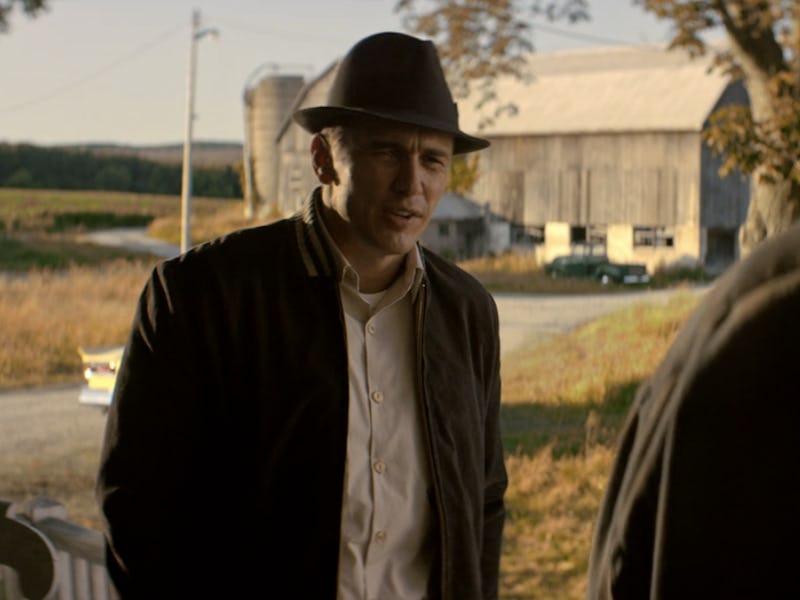'11.22.63' Takes a Detour Into the History of Violence
The JFK assassination is put on hold for a heavy-handed lesson on the roots of American brutality.

11.22.63 was never going to be a pleasant sojourn to America’s Camelot. Time’s vengeance — pushing back against lead character Jake Epping’s feeble efforts to rewrite it, per Stephen King’s plot rules — crushed any delusions of romance that the lavish 1960s sets taunted us to cultivate. The resulting sense of unease persists throughout the second episode, but not because of time’s resistance: In executive producer J.J. Abrams’ eyes, JFK-era small-town America doesn’t need plot devices to instill terror. Its rampant violence is more than enough.
After a disastrous first trip to Dallas, Jake finds himself in Holden, Kentucky, a depressed, blue-collar town where factories barely sustain its occupants. He’s there, ostensibly, to prevent a brutal murder from taking place: In the pilot, we met Harry Dunning, a trembling old janitor, who recounted — in Jake’s creative writing class — the savage butchering of his family at the hands of his drunken father on Halloween Eve, 1960. Finding himself in the Dunnings’ battered front yard, Jake steels himself to give young Harry, hiding behind his bruised mother, a chance at a better life.
It’s obvious that isn’t going to be easy here in Holden, where violence isn’t so much a reaction as it is an inherited way of life. When we first meet young Harry, he’s being stripped and spit upon by gleeful schoolyard bullies, barely pubescent. Their fathers, flooding the local bar as they’re released from the plant, terrorize the teenage bartender, Bill, into handing out rounds of free Falstaffs. Evening entertainment in Holden consists of a trip to a meatpacker’s killing floor, sledgehammers slick with calf blood. Later, the owner of a gun shop laughs — “Hell, I’ll sell you five guns!” —- as a Nixon poster winks in the window.
More unsettling than the town’s ease with this lifestyle is its resistance to change. Three generations of life in Holden have been fenced in by the effects of the war, and if anyone’s dreaming of breaking free, they sure as hell aren’t going to admit it. Resident Baptists proudly announce they read only the Saturday Evening Post and Field and Stream; writers are basically equated with communism. Only those highest up on the Holden totem pole, like Harry’s menacing father Frank Dunning, dare yearn publicly for “a little light from the outside world” — but even then he’s only joking. That intellectual shit, after all, goes right over their heads.
All of this is revealed without Jake pushing at time’s buttons, which is just as well, because he hasn’t been doing all that much. In fact, Jake and the overall plot of the show — this is supposed to be about JFK, remember? — are basically put on hold in Episode 2 to allow it to become a meandering meditation on the intellectual stagnation of America’s working class. When he’s not pulling his increasingly annoying version of Taylor Swift’s “surprised” face, Jake’s only real function in this episode is to elicit a story from a war veteran about the inextricable link between American heroism and violence. (while quoting gratuitously from James Agee’s famous paean to Depression-era sharecroppers, Let Us Now Praise Famous Men). Yes, this is King and Abrams, dropping social commentary in the form of a painfully earnest James Franco breathlessly reciting from a prewar-era exploration of American privilege. We’re getting real deep here.
After a couple of tedious monologues in which he addresses the past in a mirror — “Are you coming for me?” — and an brusque cut back to the present, Jake eventually pushes forward with his plan. The repercussions are mild, at least compared to the reality of life in Holden, and he emerges rattled but relatively unscathed. This episode’s sociology lecture signaled the possibility that 11.22.63 will continue to try to be more than it is — a Stephen King time-travel thriller — which is unfortunate, because it’s a lot more fun when it’s not taking itself too seriously.